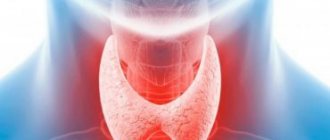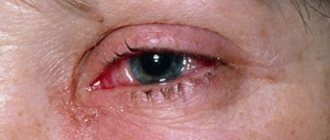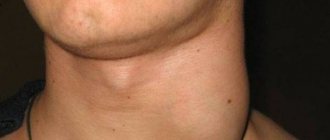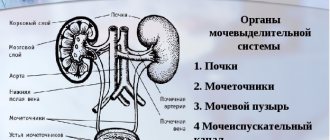Autoimmune thyroiditis
Thyrotoxicosis
23083 September 17
IMPORTANT!
The information in this section cannot be used for self-diagnosis and self-treatment.
In case of pain or other exacerbation of the disease, diagnostic tests should be prescribed only by the attending physician. To make a diagnosis and properly prescribe treatment, you should contact your doctor. Autoimmune thyroiditis: causes, symptoms, diagnosis and treatment methods.
Definition
Autoimmune thyroiditis (another name is Hashimoto's thyroiditis) is an autoimmune disease with a hereditary predisposition, in which the body begins to produce antibodies that are “hostile” to the thyroid gland (thyroid) tissue, that is, destroying its cells - thyrocytes, which are responsible for the production of thyroid hormones.
The disease is characterized by the presence of lymphocytic infiltration of the thyroid gland, destruction of follicles and proliferation of connective tissue, which over time replaces normal thyroid tissue.
The prevalence of the disease ranges from 0.1-1.2% in children to 6-11% in women over 60 years of age (women are affected approximately 5-6 times more often than men).
Causes of autoimmune thyroiditis
The main cause of the development of autoimmune thyroiditis (AIT) is antibodies to thyroid peroxidase (AT-TPO) and to thyroglobulin (AT-TG). Scientists have not yet come to a consensus on what exactly becomes the trigger for this process. However, it is customary to identify three main factors that can increase the risk of developing AIT:
- exogenous (external environmental factors): stress and environmental conditions, leading to surges in adrenaline and cortisol, adrenal insufficiency, and a decrease in the body’s adaptive reserves, which results in an increase in autoimmune diseases, including AIT; as well as long-term use of iodine-containing drugs by patients with sporadic thyroid goiter;
- endogenous (internal environmental factors) – genetic predisposition (in half of the cases, relatives of patients with AIT have antibodies to the thyroid gland in their blood serum); to realize a predisposition to the development of an autoimmune disease, additional external factors are required (viruses, various infections, medicinal and other xenobiotics - substances foreign to the body);
- other diseases against which autoimmune thyroiditis may develop.
Autoimmune thyroiditis can be considered hereditary if close relatives of the patient are diagnosed with autoimmune diseases (diabetes mellitus, rheumatoid arthritis, etc.).
Classification of the disease
There are several types of autoimmune thyroiditis.
- Latent AIT – characterized by the absence of manifestations of the disease; tests may show a slight disruption in the production of thyroid hormones; the thyroid gland may be slightly enlarged.
- Hypertrophic AIT, or Hashimoto's goiter (classic variant of the disease) – is characterized by an enlargement of the thyroid gland; distinguish:
- diffuse goiter (uniform enlargement of the thyroid gland),
- nodular goiter (uneven enlargement of the gland with the formation of nodes),
- diffuse nodular goiter (uniform enlargement of the thyroid gland with the formation of nodes).
Symptoms of autoimmune thyroiditis
Autoimmune thyroiditis develops gradually, and its symptoms depend on the stage of the disease.
Euthyroid stage of AIT.
It can last a long time (years and decades) and be asymptomatic.
Stage of thyrotoxicosis.
In some cases, AIT manifests itself in the form of thyrotoxicosis (hashi toxicosis). The main symptom of this stage is an enlarged thyroid gland (goiter). Depending on the volume of the goiter, patients complain of difficulty swallowing food and a feeling of squeezing in the neck area. On palpation, the thyroid gland has a dense, heterogeneous structure and is painless. The cause of hashi toxicosis can be either destruction of the thyroid gland or its stimulation due to the production of antibodies to TSH.
In most cases, hashi toxicosis does not have a pronounced clinical picture of thyrotoxicosis and occurs in a subclinical manner (reduced TSH levels with normal T3 and T4 values). With manifest hashi toxicosis, the T4 level increases.
Subclinical stage of hypothyroidism.
It is characterized by gradual lymphocytic infiltration of the thyroid gland, the ongoing destruction of the follicles responsible for the synthesis of thyroid hormones (T4 and T3), as a result of which their number begins to decrease. In response to this, the production of thyroid-stimulating hormone (TSH) increases, which in turn stimulates the production of thyroid hormones, so for a long time (sometimes many years) the body manages to maintain normal T4 levels.
Stage of manifest hypothyroidism.
As the follicles of the thyroid gland are destroyed, the number of thyrocytes becomes below a critical level, symptoms of hypothyroidism occur: hair loss and dryness, brittleness and thinning of nails, pale skin, decreased heart rate, weakness, drowsiness, decreased concentration, swelling, constipation, excess weight during stable or even poor appetite.
Diagnosis of autoimmune thyroiditis
Diagnosis of autoimmune thyroiditis is based on clinical and palpation data, examination of thyroid function, ultrasound diagnostics, and determination of the presence of antibodies. A puncture biopsy for AIT is not necessary and is performed only if the oncological status of the disease is suspected (that is, for differential diagnosis). To make an accurate diagnosis, several signs of the disease must be present:
- the presence of primary hypothyroidism or hashi toxicosis, confirmed by hormonal testing - for this, the level of free thyroid hormone T4 is determined (in case of manifest hypothyroidism, the values are below the reference values, in case of hashi toxicosis - normal or above normal) and the level of thyroid-stimulating hormone (TSH in hypothyroidism is increased, reduced in case of hashi toxicosis);
Fully or partially limited products
Excludes:
- pastries, cakes, cream pies, sugar;
- limit the consumption of dairy products;
- trans fats (margarine, spread), all hydrogenated, deodorized oils;
- all GMO products;
- starchy vegetables (potatoes, rutabaga, carrots, corn, beets, mature beans, peas, squash, zucchini, horseradish roots, parsnip, parsley, celery, pumpkin, Jerusalem artichoke, radish, radish);
- all types of broths, fried foods, smoked meats and sausages, duck, goose, fatty varieties of pork;
- chocolate, cocoa, strong tea and coffee;
- white rice, semolina.
Table of prohibited products
| Proteins, g | Fats, g | Carbohydrates, g | Calories, kcal | |
Vegetables and greens | ||||
| potato | 2,0 | 0,4 | 18,1 | 80 |
| radish | 1,2 | 0,1 | 3,4 | 19 |
| white radish | 1,4 | 0,0 | 4,1 | 21 |
| red radish | 1,2 | 0,1 | 3,4 | 20 |
| black radish | 1,9 | 0,2 | 6,7 | 35 |
| Jerusalem artichoke | 2,1 | 0,1 | 12,8 | 61 |
Mushrooms | ||||
| mushrooms | 3,5 | 2,0 | 2,5 | 30 |
Nuts and dried fruits | ||||
| cashew | 25,7 | 54,1 | 13,2 | 643 |
| sesame | 19,4 | 48,7 | 12,2 | 565 |
| sunflower seeds | 20,7 | 52,9 | 3,4 | 578 |
Cereals and porridges | ||||
| semolina | 10,3 | 1,0 | 73,3 | 328 |
| white rice | 6,7 | 0,7 | 78,9 | 344 |
Flour and pasta | ||||
| pasta | 10,4 | 1,1 | 69,7 | 337 |
Confectionery | ||||
| jam | 0,3 | 0,2 | 63,0 | 263 |
| jam | 0,3 | 0,1 | 56,0 | 238 |
| candies | 4,3 | 19,8 | 67,5 | 453 |
| pastry cream | 0,2 | 26,0 | 16,5 | 300 |
| cookie | 7,5 | 11,8 | 74,9 | 417 |
Ice cream | ||||
| ice cream | 3,7 | 6,9 | 22,1 | 189 |
Cakes | ||||
| cake | 4,4 | 23,4 | 45,2 | 407 |
Chocolate | ||||
| chocolate | 5,4 | 35,3 | 56,5 | 544 |
Raw materials and seasonings | ||||
| mustard | 5,7 | 6,4 | 22,0 | 162 |
| mayonnaise | 2,4 | 67,0 | 3,9 | 627 |
Dairy | ||||
| milk 3.6% | 2,8 | 3,6 | 4,7 | 62 |
| milk 4.5% | 3,1 | 4,5 | 4,7 | 72 |
| cream | 2,8 | 20,0 | 3,7 | 205 |
| sour cream 25% (classic) | 2,6 | 25,0 | 2,5 | 248 |
Cheeses and cottage cheese | ||||
| cheese | 24,1 | 29,5 | 0,3 | 363 |
| cottage cheese 11% | 16,0 | 11,0 | 1,0 | 170 |
Meat products | ||||
| pork | 16,0 | 21,6 | 0,0 | 259 |
| pork liver | 18,8 | 3,6 | 0,0 | 108 |
| pork kidneys | 13,0 | 3,1 | 0,0 | 80 |
| pork fat | 1,4 | 92,8 | 0,0 | 841 |
| salo | 2,4 | 89,0 | 0,0 | 797 |
| beef liver | 17,4 | 3,1 | 0,0 | 98 |
| beef kidneys | 12,5 | 1,8 | 0,0 | 66 |
| beef brains | 9,5 | 9,5 | 0,0 | 124 |
Sausages | ||||
| smoked sausage | 16,2 | 44,6 | 0,0 | 466 |
| smoked sausage | 9,9 | 63,2 | 0,3 | 608 |
| sausages | 10,1 | 31,6 | 1,9 | 332 |
| sausages | 12,3 | 25,3 | 0,0 | 277 |
Bird | ||||
| smoked chicken | 27,5 | 8,2 | 0,0 | 184 |
| duck | 16,5 | 61,2 | 0,0 | 346 |
| smoked duck | 19,0 | 28,4 | 0,0 | 337 |
| goose | 16,1 | 33,3 | 0,0 | 364 |
Fish and seafood | ||||
| smoked fish | 26,8 | 9,9 | 0,0 | 196 |
| salted fish | 19,2 | 2,0 | 0,0 | 190 |
| Red caviar | 32,0 | 15,0 | 0,0 | 263 |
| black caviar | 28,0 | 9,7 | 0,0 | 203 |
| canned fish | 17,5 | 2,0 | 0,0 | 88 |
| cod (liver in oil) | 4,2 | 65,7 | 1,2 | 613 |
Oils and fats | ||||
| sunflower oil | 0,0 | 99,9 | 0,0 | 899 |
| animal fat | 0,0 | 99,7 | 0,0 | 897 |
| cooking fat | 0,0 | 99,7 | 0,0 | 897 |
Non-alcoholic drinks | ||||
| instant coffee dry | 15,0 | 3,5 | 0,0 | 94 |
| black tea | 20,0 | 5,1 | 6,9 | 152 |
| * data is per 100 g of product | ||||
Causes of the disease - why does the immune system attack the thyroid gland?
The final causes of AIT are not reliably known to medicine. The hormonal system is a very complex structure that is still being studied by specialists.
But there are known factors that provoke the occurrence of autoimmune thyroiditis:
- inflammatory processes in the thyroid gland;
- chronic infections (not only in the thyroid gland);
- psychological factors (stress, depression);
- uncontrolled use of certain drugs;
- unfavorable environmental conditions;
- excess iodine intake;
- ARVI, etc.
Key factors are predisposition and genetic changes.
Etiology
Like any autoimmune disease, chronic autoimmune thyroiditis is based on a defect in the genes responsible for the production of specific autoantibodies. As a rule, these changes are determined in the form of polymorphisms, the pathological effect of which is initiated by environmental factors:
- negative impact of polluted environmental factors;
- use of interferon;
- infectious and viral diseases;
- uncontrolled long-term use of iodine-containing drugs
- radiation exposure.
There is also a hereditary predisposition to the development of CAIT. Most often, girls whose mothers already suffer from this pathology are affected.
What are the consequences if left untreated?
Autoimmune thyroiditis is a pathological process of destruction of thyroid cells, which leads to disruption of metabolic processes in tissues and the production of hormones.
The consequences of AIT include pathologies of the cardiovascular system:
- atherosclerosis;
- arrhythmia;
- heart failure;
- myocardial infarction.
Hormonal imbalance leads to the following consequences:
- miscarriages and infertility;
- the inability of the body to bear a fetus;
- myxedema.
Other pathologies may also develop:
- congenital hypothyroidism;
- depression;
- acquired dementia in children (dementia).
A common consequence is myxedema (insufficient supply of thyroid hormones), which will lead to hypersensitivity to low temperatures. The danger lies in the severe perception of any ARVI, which can provoke a hypothyroid coma with myxedema.
In most cases, after autoimmune thyroiditis, patients have to be treated for hypothyroidism. But both diseases are reversible and easily treatable.
Menu (Power Mode)
Organize 5 meals a day, this will prevent you from feeling hungry during the day. Avoid foods containing hidden fats and do not use them in cooking. With any heat treatment, beneficial fatty acids are converted into toxic ones. You can fry in edible coconut oil, which does not collapse when heated and can withstand temperatures up to 3500. It is better to avoid frying and use a steamer or oven. Eliminate simple carbohydrates and replace sweets with dried fruits.
| Breakfast |
|
| Lunch |
|
| Dinner |
|
| Afternoon snack |
|
| Dinner |
|
| For the night |
|
Reviews and results
Diet can be considered as a healthy diet, which must be constantly followed and become the rule of life for patients. Balance allows you to adhere to it constantly. Reviews note the positive aspects of the diet: weight loss, swelling and constipation are eliminated, and overall well-being improves.
- “... I started sticking to this diet not so much because of thyroiditis, but because of increased weight and cholesterol. I read it and realized that the nutritional recommendations are similar - seafood, healthy oils, nuts, vegetables and fruits. I can note that my condition has improved, my weight has dropped, and my swelling has gone away. But the diet did not affect the antibodies, and thyroiditis as such does not bother me, unless I know about the tests. I’m still happy with the results”;
- “... I was on a gluten-free diet for 3 months, and all this time I cooked for myself separately. The exclusion of many grains, sweets and flour products immediately had a positive effect on weight. She noted that her intestines became lighter, pain, colic and bloating disappeared. This makes me happy too. Of course, my general condition improved and I felt more cheerful. But! Antibody levels did not decrease. I’ll try to sit on it for another 2 months, if there are no results, I’ll turn on grains and eat normally”;
- “...On a diet for 3 months, I lost 5 kg. I felt relief because the water was gone and my intestines began to function normally. I cook for myself separately and it’s a little annoying because I don’t have time. I like the food because it is wholesome and healthy. I make diet yogurt myself, bake bran bread, and eat a lot of vegetables and fish. Even if the tests do not improve, this undertaking will still not be useless.”
Prognosis for treatment
Any medical diagnosis sounds scary to patients. The question immediately arises: what could be the consequences? The prognosis for autoimmune thyroiditis, provided treatment is carried out, is favorable.
If the disease was advanced and treatment began at the third or fourth stage, chronic hypothyroidism may persist, which will require hormone replacement therapy throughout life.
After completing treatment, to prevent relapses, you should take hormone tests and undergo an ultrasound of the thyroid gland twice a year. If any abnormalities are noted based on the diagnostic results, you should immediately contact an endocrinologist.
The occurrence of minor consequences, which may appear in the first stages before the start of treatment, is eliminated quickly. Only in 10% of cases, autoimmune thyroiditis has complications, despite the therapy.
Medicines that provoke AIT
• NSAIDs – non-steroidal anti-inflammatory drugs. They relieve pain, reduce fever, and reduce inflammation. The most famous are aspirin, ibuprofen, diclofenac.
• Corticosteroids – often used to relieve symptoms. They come in different forms - inhalers, tablets, injections, etc. Sometimes they are critical to life. They undermine the immune system, promote leaky gut syndrome, and inhibit the healing process. From the moment you follow the autoimmune nutritional protocol, you need to work out with your doctor an approach to gradually abandoning them.
• PPIs – proton pump inhibitors. For the treatment of acid-related gastrointestinal diseases, gastric acidity is reduced.
Lanzoptol, Nexium, Epicurus, Losek, Neozect, Pariet, Omez.
• H2 blockers – histamine receptor blockers. Roxatidine, nizatidine, etc.
• Antibiotics – direct negative effect on microflora
• Hormonal contraceptives (COCs) – affect the immune system, and their use can make it difficult for the body to recover through diet and lifestyle.






